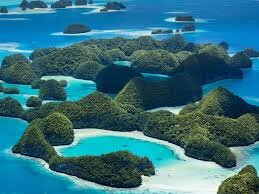
Our Ocean Conference, Palau
The annual Our Ocean Conference will be held in a Pacific country for the first time.
The annual Our Ocean Conference will be held in a Pacific country for the first time.
The themes are:
addressing marine pollution;
managing, protecting, conserving and restoring marine and coastal ecosystems;
minimizing and addressing ocean acidification, deoxygenation and ocean warming;
making fisheries sustainable and providing access for small-scale artisanal fishers to marine resources and markets;
promoting and strengthening sustainable ocean-based economies, in particular for small island developing States (SIDS) and least developed countries (LDCs);
increasing scientific knowledge and developing research capacity and transfer of marine technology;
enhancing the conservation and sustainable use of oceans and their resources by implementing international law, as reflected in the UN Convention on the Law of the Sea (UNCLOS); and
leveraging interlinkages between SDG 14 (life below water) and other Goals towards the implementation of the 2030 Agenda.
Caribbean countries come together to discuss the opportunities and financing of the marine economy. The conference will conclude with a ministerial meeting and a parallel youth forum on the morning of 25 March.
Due to the decline in participation as delegates choose not to travel because of Covid-19, the organisers have postponed until normal travel has been resumed.
CCOA holds its first major conference, to review progress ahead of CCOA co-lead Britain handing over the Chair of the Commonwealth to Rwanda in June. With more than 30 of the 53 Commonwealth countries signed up as members of CCOA, the conference will look at how collaboration in science, policy and action can drive solutions to mitigate the harm of plastics pollution in the marine environment.
Convened by the Secretariat of the Pacific Regional Environment Programme (SPREP), this annual forum will debate environmental challenges facing Pacific nations and how collaboration can improve impactful solutions. Conclusions from the forum will be tabled when Environment Ministers meet in Apia on Friday 6 September.
Maui’s Ark founder Stephen Harris will share insights from 10 months driving international collaboration to stem the tide of marine plastics pollution in his role as Special Representative of the Commonwealth Clean Ocean Alliance. What challenges for global diplomacy are posed by this environmental consequence that respects no borders - and reflects our modern consumer and industrial model?
The first of CLIP’s regional conferences for 2019 will hear the results of waste management studies and marine litter plans for Vanuatu and Solomon Islands. CLIP is part of the Commonwealth Clean Oceans Alliance
As dusk falls in Wellington, a cast - or crew - of thousands will take part in a celebration of New Zealand's voyaging past to open the New Zealand Festival. A fleet of double-hulled Pacific vaka and Maori waka taua, or war canoes, will be the visual highlight of an event that will also include sounds of the Pacific, a mass choir, a thousand-strong haka and a musical score by Warren Maxwell (Trinity Roots, Little Bushman). On 24 February the vaka and waka will beach on the Petone foreshore, inviting people to come on board. (Photo shows a similar scene from Waitangi in February 2015). Maui's Ark will take you behind the scenes, talking with some of the crew conducting a scientific survey one of the vaka will make collecting waste plastic waste as it sails down the East Coast to the rendezvous in Te Upoko O Te Ika - the mouth of Maui's fish, ie Wellington Harbour.
Indonesia, with its 17,000 islands, stretches like a boom net across major sea lanes of Asia and the Pacific, including its links to the Indian Ocean. Indonesia's location and its population of mainly poor but increasing middle class mean it shares many characteristics of the region - including an affliction from plastic rubbish in its seas and waterways and along its extensive coastlines. Maui's Ark founder Stephen Harris is leading the New Zealand delegation to this conference, which we are co-chairing with Indonesia, to gather some of the world's largest, richest and most populous countries to find solutions to marine plastic debris - among them China, India, the United States, Russia, Japan and South Korea, plus New Zealand, Australia and most South East Asian countries.
500 billion single-use plastic bags are consumed annually around the world. 28,500 tonnes of expanded polystyrene (EPS) was produced in 2014, 90% of which was used to make single-use products. The bulk of single-use EPS waste is not recycled. The sheer volume of single-use plastics produced and consumed globally is emblematic of the planned obsolescence that characterises linear economies.
The complexities inherent in the ways in which plastic is produced, consumed, and discarded are never purely material, social, nor stable. As such, addressing the social and environmental issues surrounding plastic requires an interdisciplinary focus that crosses the traditional divisions between the sciences, social sciences, arts, and humanities. This nearly-carbon neutral conference aims to encourage presentations that articulate the value and challenges constitutive of such interdisciplinary collaborations.
WATCH! Stephen Harris's presentation on 'The Plastic Chain', describing how we can all pull together to stop plastic choking our oceans and sealife will be viewable here from the start of the conference.
